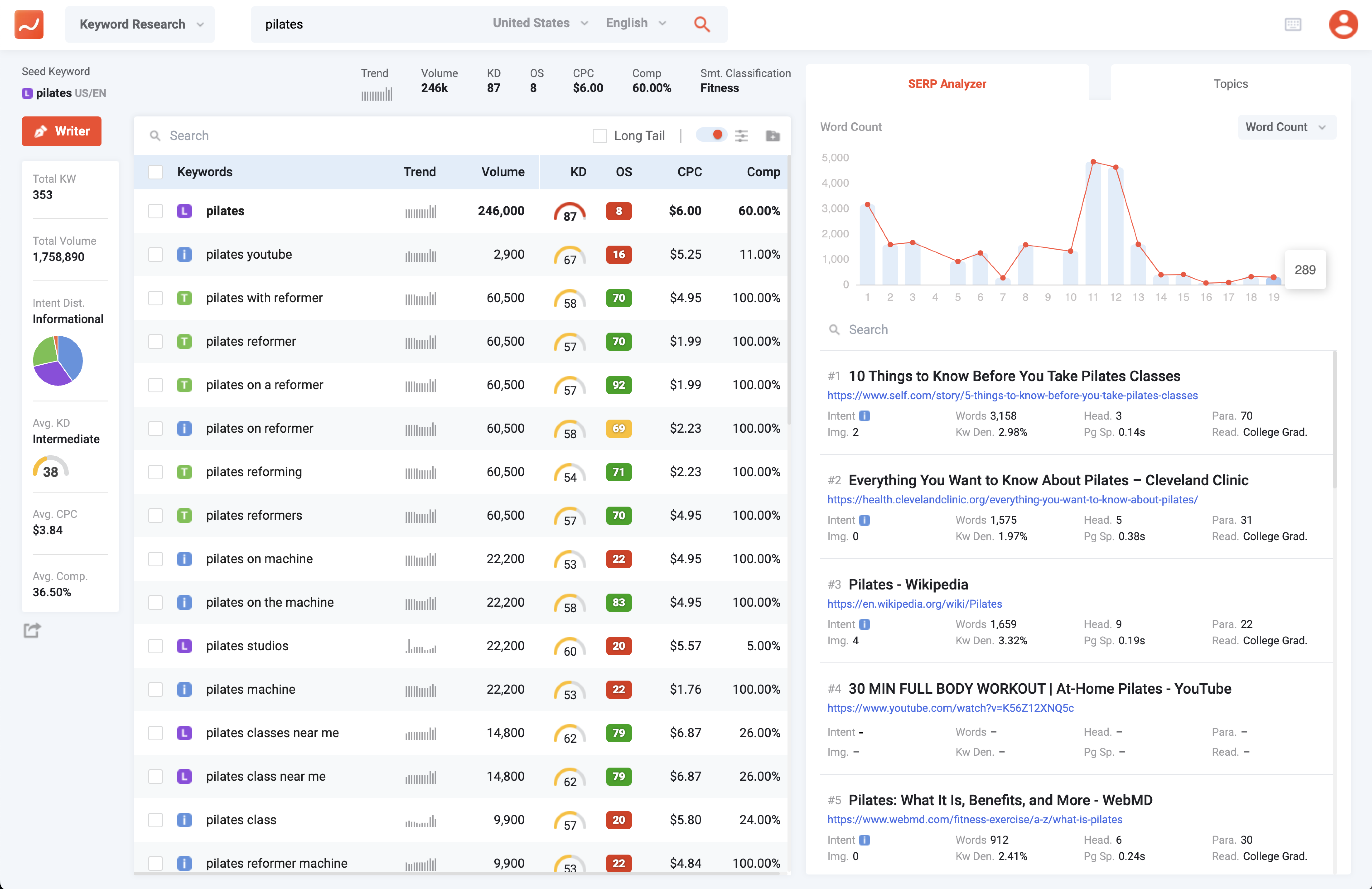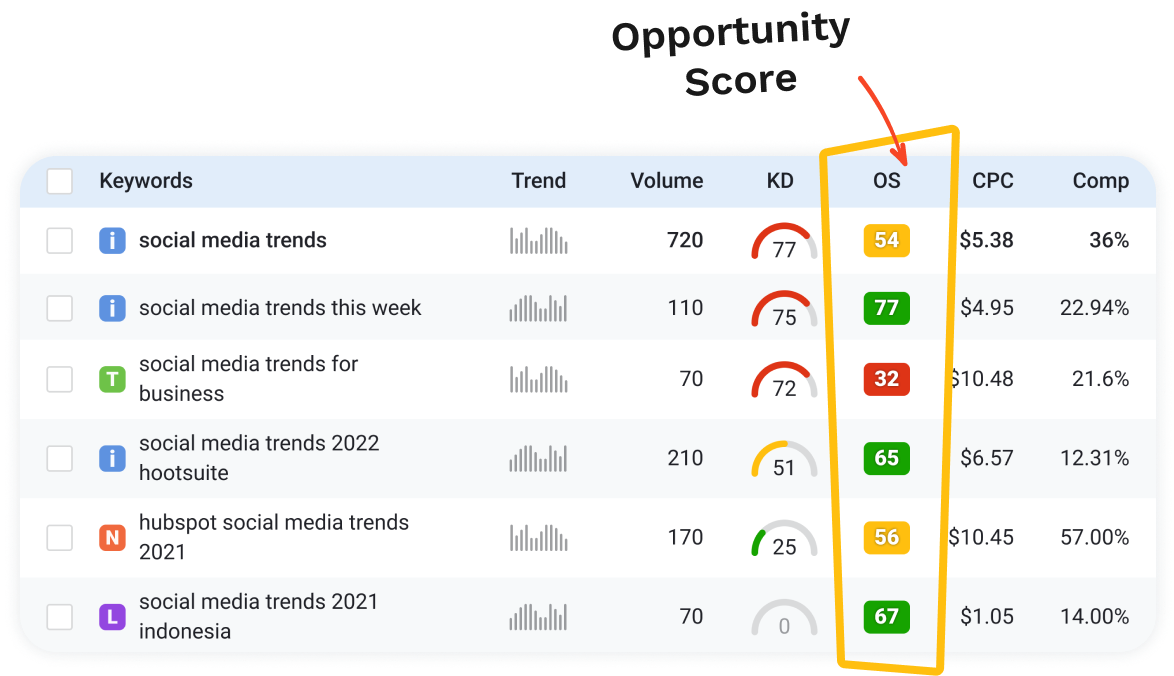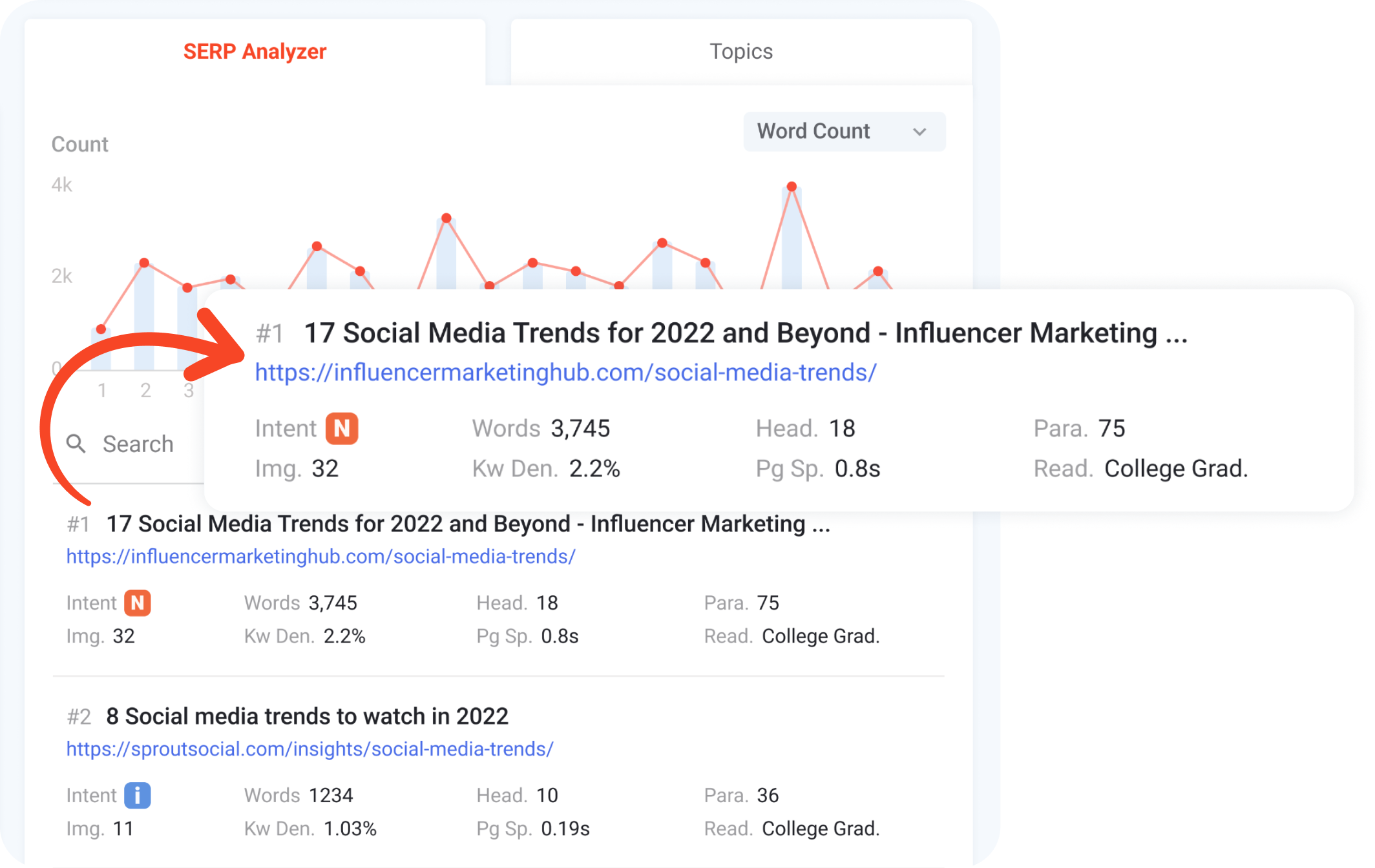Steph W. from SEOPressor


...help you check your website and tell you exactly how to rank higher?


85
score %
SEO Score

Found us from search engine?
We rank high, you can too.
SEOPressor helps you to optimize your on-page SEO for higher & improved search ranking.
By claire on January 21, 2022
You can find plenty of helpful tips for finding the best keyword ideas for SEO in this article. Go through this 5-step process, and then you can level up your business SEO content.
Many new businesses don’t even consider doing keyword research, and because of this, they struggle to get visitors to their website, no matter how hard they try. Others simply go after keywords that are the most popular (but also very competitive) and fail to rank well in Search Engines.
Still, keywords play an essential role in SEO. And we also understand that generating keyword ideas, especially the one that brings you traffic, is not easy work.
I firmly believe that finding a standard and effective keyword research method is what everyone who has been working in the field of SEO is doing.
This blog can help you to find everything you need to know when researching your relevant keywords. Go through the 5 steps to get incredible keyword ideas with us now, and you can start doing your own quality keyword finding.
One good news: You don’t have to guess whether a specific keyword is the best choice for your organic traffic goals; because there are tons of excellent tools out there specifically designed to help you identify the best search terms and phrases to use in your text.
Keywords are words or phrases that help search engines identify the topics that your content covers. Algorithms of the SERP have sophisticated systems for analyzing the keywords that users employ in their queries and the terms used throughout a given piece of content. This helps them match the user with the content that best answers their needs.
Keyword optimization is one of the most widely adopted SEO techniques. Within optimizing content, the common goal for businesses is to rank highest on the SERP.
Keyword research and optimization can improve your chances of showing up on page 1 of the search results. Data from 2020 shows that most title tags on Google’s first page contained keywords that were an exact or partial match of that search query.
The excellent and reasonable coverage of keywords helps you communicate to Google that your web page is a relevant match for a query. That means keywords can improve search engine rankings by assisting Google in understanding the web page content.
Aside from rankings, keyword research has other benefits that can help you better serve your consumer.
The majority of your advertising and marketing will use keywords as the primary method for attracting customers, and keywords are words or phrases that are used to match your ads or content with the terms people are searching for. These will be the proper foundation of your campaigns. So selecting high-quality, relevant keywords for your campaigns is critical.
In the end, the right keywords will get your content in front of the right people at the right time, thus, driving more qualified traffic to your web pages.
All of these above matter for SEO. To elaborate, keyword research helps you understand the way your target audience might describe and look for your products or services. It also shows you how people ask for more information on your topics when using a search engine.
Yet, there is one emerging problem: The vast majority, up to 92.42% of keywords, have a monthly search volume less than 10.
So it is significant to see that choosing the relevant keywords is vital yet not easy.
Keep reading because the five simple steps outlined below will walk you through how to research keywords for SEO:
Without thinking about anything else, start your process by writing down all of the things that interest you (of course, it needs to connect to your business). These can be personal interests or professional interests.
Think about what you want to discover or enjoy doing while surfing the internet to learn more about your niche. Imagine what they’re searching for and the terms you’re going to use. Think of specific search words for each product or service category you have available and use personas to get in your customer’s head.
Imagine you have a photography studio and thought photography blogging could be a great niche. You can share photos, learn about camera technology, and provide information about your service.
Or another example, you have a cooking class business. Your target audience would be people interested in taking up cooking classes. Even if you don’t have the time or budget to start a massive social media campaign, you can create a food blog to analyze recipes online. You could also discuss choosing the perfect ingredients and weighing the benefits of organic versus GMO ingredients.
Another example, you are starting a blog about the gym. The first keywords that come to your mind are ones that you would use in a Google search:
These would be your seed keywords and broad topic ideas.
Search intent (also called user intent) is users’ primary goal when typing a query in search engines.
There are 4 main types of searcher intents, and each comes with different goals:
Navigational: people search for a specific page or website.
You can have product keywords that focus on a particular product category, brand name, or service. People using these phrases are in the early buying stage. For instance:
Informational: people search for detailed information such as definitions, recipes, how-to, or in-depth information about the product/service.
The bulk of keywords online is “Informational keywords.” It’s natural for people to look for information before starting the buying process. Information keywords tend to include words like:
Transactional: people search for something when they are ready to make a purchase.
Specifically, keywords related to transactional can be the type of “Buy Now” keywords. These are keywords that people use before making a purchase. Here are words that tend to be part of these types of search queries:
Commercial investigation: people search for the comparison of products or reviews. This is similar to information intentions, but it goes more to the commercial side.
For the commercial investigation, product keywords tend to include:
You will need to determine what keywords to focus on for each intent. Besides, you need to identify a suitable searcher’s intentions for each goal.
If one of your goals is to make money online, you must select commercial intent keywords.
It’s time for you to get your keywords. There are many ways, but commonly, we will show you the 3 most accessible and fastest methods.
If you are on the fence about a keyword, run a Google search with it.
Google has more data on search activity than anyone. Ever noticed as you type a phrase into the Google search field, it begins guessing what you’re looking for? The system is anticipating your needs based on the popularity of past searches and attempting to save you time by offering suggestions. So, you need to see what sites, phases, and words come up. Would your site make sense with those results? Are there ads on the results page? Does it look like there’s a lot of competition for that keyword?
Apply this “Google Suggest” way.
And also, you can even get more ideas on the related content suggested at the end of the search result pages:
Without keyword research tools, finding the correct terms to incorporate into your blog or online store content to help it rank on search engine results pages would be like throwing darts in a dark room.
You can get serious with our favorite tool. You have more tools that you can use to find more keyword ideas. Some of them are free, freemium, or paid.
LSIGraph is one of our favorite paid keyword research tools. LSIGraph’s Keyword Research offers plenty of data on what people search for and how competitors rank for similar terms.

A simple search returns tonnes of semantic keywords. Semantic keywords are contextually-related keywords like synonyms, co-occurring terms, or implied words that you could use in your content to increase your keyword density while avoiding the trap of keyword stuffing.
LSIGraph shows you important metrics for each of the keywords including its search volume, difficulty, cost-per-click, and competition. Their proprietary Opportunity Score evaluates the keywords and tells you which keywords you can rank for with the least amount of effort.

Besides finding you the best keywords, LSIGraph also shows you how top-ranking pages are structuring their content with LSIGraph SERP Analyzer so you can structure your content page after them.

You can also use LSIGraph to find long-tail keywords–keywords that contain at least three words, and questions and sentences that could be used as title inspiration.
LSIGraph is intuitive to use even if you do not have a background in SEO.
Another way to find valuable keywords is to spy on your competitors.
Investigating your competitors can be a great way to come up with ideas that you never would have thought of in the first place and can inform the rest of your keyword research later on. We’re typically referring to keywords that your competitor ranks well in search results, as well as the keywords of top competitors that are targeting but have failed to rank well for.
Of course, you can not do this manually. You can use a tool to support you, and RankingGap can be the one for you.
RankingGap is one of the latest and unique keyword gap analysis tools that were made to let users conduct our keyword gap analyses quickly and efficiently.
The 4 keyword views, Common – Missing – Gap – Unique, were specially designed to help users claim their competitive advantage.
To read more about competitor keywords analysis, read this: SEO Competitor Analysis: A complete guide you need to know.
The fourth step is to analyze the data to choose your best keywords group.
The tip here for you is to organize by theme. Group all of your keywords into tightly related themes, and as you look at that list of articles, see if you can break them up into sub-themes. And again, the more thematic, the better results that you’ll have.
So if you have an ad group for women’s bags, you would want to get more granular and create themed keywords such as women’s handbags, women’s backpacks, women’s clutch, women’s fashion bags, and so on.
The above tip is based on the meaning; however, the most important are search volume, CPC, or cost-per-click.
The search volume shows how many users search for each keyword per month. The higher the search volume, the more users are interested in that particular keyword.
The cost-per-click is data pulled in from Google AdWords or Google Ads that represents how many advertisers are trying to place ads for that keyword.
So when discussing how to find keywords, the ideal keyword would have a high monthly search volume but a low cost-per-click. This means that many users are searching for this information, but not many websites are trying to rank for it.
Even though a keyword may have a lot of search traffic, you always want to ask yourself if that keyword will bring you quality traffic.
For example, “Glass Tile” might have a ton of search volume, but if you only sell ceramic tile, your chance of making a sale from those visitors is low. Make sure that the keywords you target result in conversions and revenue.
Now, you can use your keywords in your content.
When your page shows up in search results, the page title is the first thing someone will see. When the keyword they’re searching for appears in the title, it indicates that they’ve found what they’re looking for. And most importantly, Google pays attention to those page titles as well!
Try to use your keyword at the beginning of the title for maximum effectiveness.
When someone searches for “content marketing for beginners,” they not only see it in our title but in the meta description as well. This is to get an overview of the page content without click reading.
You provide relevant content that answers questions and assists visitors in purchasing. Engaging, easy-to-understand content will hook visitors and keep them on your page, but you also need to include keywords so that Google can show them your page.
It’s best to assign a keyword to a single page and then do everything you can to optimize your page for that keyword.
Using the correct keywords is critical for you to attract the right audience. You don’t want to drive opposing traffic to your site, in other words, an audience that is misdirected and not interested in your products.
You can now use many SEO keyword generator tools to generate tons of keyword ideas. Try out the incredible one like LSIGraph to quicken your process.
Updated: 14 July 2025


Save thousands of dollars (it’s 100x cheaper)

Zero risk of Google penalty (it’s Google-approved)

Boost your rankings (proven by case studies)
Rank High With This Link Strategy
Precise, Simplified, Fast Internal Linking.
